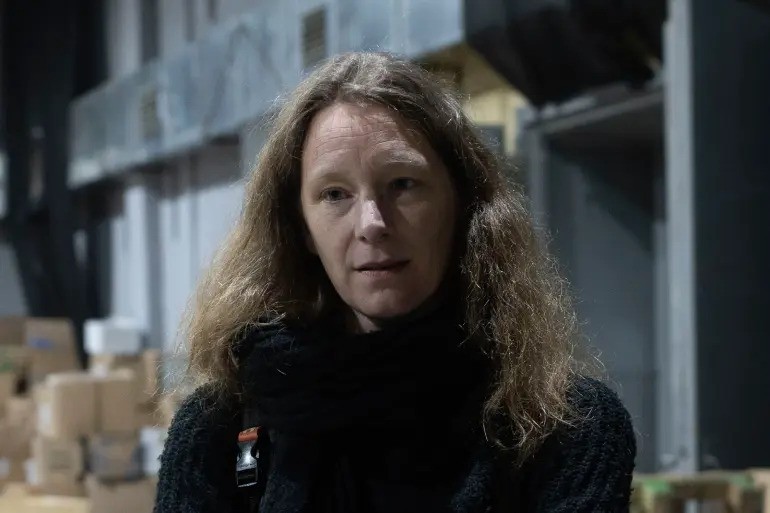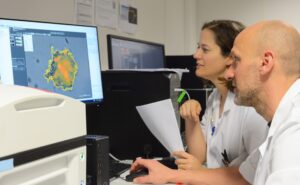What is the current situation in Mayotte?
The situation in Mayotte remains critical. Nearly a third of brick-and-mortar homes lost their roofs, while “bangas,” makeshift homes that make up 40% of the island’s housing, were entirely destroyed by Cyclone Chido. Access to clean water is severely limited, forcing residents to rely on rivers and untreated sources for drinking and washing. This poses serious health risks, with fears of rapidly spreading diseases—especially on an island recently affected by cholera. Waste management, already a challenge before the cyclone, has become a dire issue.
To address immediate needs, Fondation de France is actively supporting long-standing local organizations such as Solidarités International, which leads a coalition of local associations well-acquainted with the hardest-hit populations. These groups are distributing hygiene kits, water filtration systems, and repairing spring water distribution and wastewater management systems.
Since January 1, some shops have reopened, but product prices remain prohibitively high for many residents. Cyclone Chido’s destruction of trees and crops has worsened food insecurity, while the heat and humidity exacerbate already harsh living conditions. Despite these challenges, the local civil society has demonstrated remarkable engagement and resilience, playing a key role in mobilizing resources and driving initiatives.
Since December 25, I have been on the ground to assess the population’s needs and meet with local associations, such as the Territorial Management of Tsingoni, with whom we collaborate under our program “Preparing for and Responding to Crises and Disasters.” I have also met with local and national authorities to ensure our actions are well-coordinated, complementary, and effective.
What priorities has Fondation de France identified?
In any emergency response, several core principles guide our actions. First, proximity: whether in France or internationally, Fondation de France works with organizations that are deeply rooted in the affected communities to better understand their needs. Flexibility is also essential, as emergency contexts require adapting to local partners and streamlining processes. Finally, long-term commitment is vital, as demonstrated by our actions following the 2017 hurricanes in the Caribbean.
Currently, our priorities are focused on water access and food security. We prioritize solutions that stimulate the local economy, such as distributing food vouchers rather than relying on external supply chains, thereby supporting small businesses.
Another major priority is education. Schools are scheduled to reopen on January 20, but only 20% of school buildings remain usable, as most were heavily damaged or repurposed as temporary shelters for displaced families. Fondation de France is exploring temporary solutions such as open-air classrooms or eco-constructed spaces made from recycled materials that meet cyclone and earthquake resistance standards. We have also started providing new school supplies through our partners.
Mental health is another critical issue. We are working with Terra Psy, an association we partner with in Morocco, which is currently assessing mental health needs in schools at the request of the local education authority.
In terms of reconstruction, it is crucial to adopt a sustainable and pragmatic approach while involving all stakeholders. While makeshift housing is being rebuilt out of necessity, it is essential to support these efforts by providing technical advice and raising awareness about safer construction standards. We are currently collaborating with Compagnons Bâtisseurs, a group we have worked with on post-cyclone recovery in Saint-Martin. Projects under consideration include the rehabilitation of an eco-neighborhood with about 40 homes, developed in partnership with residents.
The issue of land ownership, which limits relocation possibilities, must also be addressed in collaboration with local authorities to identify innovative and inclusive solutions.
Agricultural recovery is another urgent priority, as the cyclone devastated local crops. This will take time, but we aim to support sustainable farming practices, such as agroforestry, which were already being developed before the disaster. We will also assist small-scale farmers in re-equipping their operations.
What are the main challenges and areas of focus following this disaster?
Coordination among different actors—associations, local authorities, and state agencies—is essential. Fondation de France actively participates in intersectoral meetings to foster constructive dialogue and develop collaborative reconstruction solutions.
We are committed to including all communities living in Mayotte without discrimination, with special attention given to the most vulnerable groups, including women, children, and the elderly.
Our ultimate goal is to support reconstruction efforts that are fair, sustainable, and inclusive while addressing short-term needs to alleviate the suffering of affected populations.
Cover image: Karine Meaux in the Field © Fondation de France. Article adapted from French on the Fondation de France webiste: https://www.fondationdefrance.org/fr/cat-urgences/itw-karine-meaux-mayotte.



